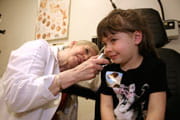 The Division of Pediatric Otolaryngology at UPMC Children’s Hospital of Pittsburgh has an extensive research program that began in 1975 and has since become “the place” for the treatment of otitis media, which includes ear infections and fluid build-up in the middle ear. No institution has done more to shed light on the pathogenesis of otitis media and point the way toward improved therapies than Children’s. Our clinical Ear, Nose and Throat (ENT) Research Center, Middle Ear Physiology Laboratory, and Basic Research Laboratory are engaged in numerous clinical and laboratory studies investigating the causes, development, and management of middle ear disease, as well as other pediatric ear, nose, and throat disorders.
The Division of Pediatric Otolaryngology at UPMC Children’s Hospital of Pittsburgh has an extensive research program that began in 1975 and has since become “the place” for the treatment of otitis media, which includes ear infections and fluid build-up in the middle ear. No institution has done more to shed light on the pathogenesis of otitis media and point the way toward improved therapies than Children’s. Our clinical Ear, Nose and Throat (ENT) Research Center, Middle Ear Physiology Laboratory, and Basic Research Laboratory are engaged in numerous clinical and laboratory studies investigating the causes, development, and management of middle ear disease, as well as other pediatric ear, nose, and throat disorders.
One of the facets that makes Children’s ENT research program unique is the Middle Ear Physiology Laboratory in Oakland, which has a special pressure chamber that allows researchers to study the middle ear system without having a perforation in the eardrum, as with earlier methods. The chamber, which simulates pressures similar to those experienced underwater as well as on an airplane, was added as part of a $5-million study funded by the National Institutes of Health (NIH) to investigate the cause and treatment of otitis media. Children’s researchers have used this facility to gain better understanding of pediatric and adult middle ear conditions.
In one ongoing study, children enrolled at the age of 3 undergo annual Eustachian tube function testing until they are 7, enabling researchers to measure Eustachian tube development and compare among children with histories of recurrent ear infections or persistent middle ear fluid or no history of significant middle ear disease. Another NIH-funded study investigates whether a small change in the surgical repair of a cleft palate makes a significant difference in decreasing middle ear disease.
Children who are having their eardrums patched are being studied to see whether researchers can predict outcomes through Eustachian tube function testing prior to surgery. Patients being seen by Children’s Aerodigestive Center, who are diagnosed with laryngomalacia (a floppiness of the voice-box) can participate in a quality-of-life study, which may lead to better therapies and ways to improve their treatment experience.
Our researchers are also participating in a multi-center study of the genes and virus involved in an uncommon childhood disease, recurrent respiratory papillomatosis.
Several adult ear studies are also underway. One involves testing Eustachian tube function during a “cold.” Another investigates risk factors, such as allergy and acid reflux, in adults with ear tubes. Adults with ragweed allergies are being enrolled in another study investigating whether nasal challenge with ragweed provokes changes in middle-ear pressure.
The Division of Pediatric Otolaryngology has received continuous research funding from the NIH for nearly 40 years, and is a recognized Center of Research Excellence with an international reputation for its contributions.









 The
The